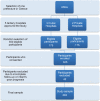Maternal tobacco, alcohol and caffeine consumption during the perinatal period: A prospective cohort study in Greece during the COVID-19 pandemic
- PMID: 37333502
- PMCID: PMC10273827
- DOI: 10.18332/tid/166109
Maternal tobacco, alcohol and caffeine consumption during the perinatal period: A prospective cohort study in Greece during the COVID-19 pandemic
Abstract
Introduction: Low-level knowledge of problematic substance use during the perinatal period may lead to numerous adverse outcomes. We sought to determine maternal tobacco, alcohol and caffeine consumption during the perinatal period during the COVID-19 pandemic.
Methods: This prospective cohort study recruited women from five Greek maternity hospitals between January and May 2020. Data were collected with a structured questionnaire initially completed by postpartum women during their hospitalization and re-administered via telephone interview in the first, third and sixth month postpartum.
Results: The study sample consisted of 283 women. Smoking rates decreased during pregnancy (12.4%) compared to the pre-pregnancy period (32.9%, p<0.001) and during lactation (5.6%) compared to the antenatal period (p<0.001). The smoking rate increased again after breastfeeding cessation (16.9%) compared to the rate during lactation (p<0.001), but remained lower than the pre-pregnancy rate (p=0.008). Only 1.4% of the women reported breastfeeding cessation due to smoking, whereas those who smoked more during pregnancy were more likely to cease breastfeeding (OR=1.24; 95% CI: 1.05-1.48, p=0.012). Regarding alcohol consumption, it was significantly lower during pregnancy (5.7%), lactation (5.5%) and after breastfeeding cessation (5.2%) compared to the pre-pregnancy period (21.9%, p<0.001 for all correlations). Women who consumed alcohol during lactation were less likely to wean (OR=0.21; 95% CI: 0.05-0.83, p=0.027). Caffeine intake decreased during pregnancy compared to preconception period (p<0.001), while in lactating women it remained at low rates until the 3rd month of follow-up. Caffeine consumption at one month postpartum (β=0.09; SE=0.04, p=0.045) was positively associated with longer duration of breastfeeding.
Conclusions: Tobacco, alcohol and caffeine consumption decreased in the perinatal period compared to the preconception period. The pandemic may have contributed to the downtrend in smoking and alcohol consumption due to COVID-related restrictions and fear of potential illness. Nevertheless, smoking was associated with reduced duration of breastfeeding and breastfeeding cessation.
Keywords: COVID-19 pandemic; alcohol; caffeine; maternal consumption; tobacco.
© 2023 Tigka M. et al.
Conflict of interest statement
The authors have completed and submitted the ICMJE Form for Disclosure of Potential Conflicts of Interest and none was reported.
Figures
Similar articles
-
Frequency and Determinants of Breastfeeding in Greece: A Prospective Cohort Study during the COVID-19 Pandemic.Children (Basel). 2022 Jan 2;9(1):43. doi: 10.3390/children9010043. Children (Basel). 2022. PMID: 35053668 Free PMC article.
-
[Assessment of stimulant use especially caffeine intake in selected group of the breastfeeding women].Rocz Panstw Zakl Hig. 2012;63(2):171-8. Rocz Panstw Zakl Hig. 2012. PMID: 22928364 Polish.
-
Medication Intake as a Factor for Non-Initiation and Cessation of Breastfeeding: A Prospective Cohort Study in Greece during the COVID-19 Pandemic.Children (Basel). 2023 Mar 18;10(3):586. doi: 10.3390/children10030586. Children (Basel). 2023. PMID: 36980144 Free PMC article.
-
The effect of lactation on ovulation and fertility.Clin Perinatol. 1987 Mar;14(1):39-50. Clin Perinatol. 1987. PMID: 3549114 Review.
-
Tobacco Smoke Exposure and Lactation.Cureus. 2024 Nov 13;16(11):e73651. doi: 10.7759/cureus.73651. eCollection 2024 Nov. Cureus. 2024. PMID: 39677116 Free PMC article. Review.
Cited by
-
COVID-19 pandemic, pregnancy care, perinatal outcomes in Eastern Myanmar and North-Western Thailand: a retrospective marginalised population cohort.BMC Pregnancy Childbirth. 2024 Oct 2;24(1):637. doi: 10.1186/s12884-024-06841-0. BMC Pregnancy Childbirth. 2024. PMID: 39358743 Free PMC article.
-
Smoking Status in Pregnancy: A Retrospective Analysis in Northern Greece.J Clin Med. 2025 Jan 11;14(2):431. doi: 10.3390/jcm14020431. J Clin Med. 2025. PMID: 39860437 Free PMC article.
-
Impact of Exogenous Factors and Anesthetic Risk in Premature Birth during the Pandemic Period.Diagnostics (Basel). 2024 May 29;14(11):1123. doi: 10.3390/diagnostics14111123. Diagnostics (Basel). 2024. PMID: 38893649 Free PMC article.
-
A Retrospective Observational Study on Post-Pandemic Effects of Endogenous and Exogenous Factors on Prematurity in Pregnant Women Under 18 Years of Age.Healthcare (Basel). 2025 Jan 19;13(2):197. doi: 10.3390/healthcare13020197. Healthcare (Basel). 2025. PMID: 39857224 Free PMC article.
References
-
- European Commission, Directorate-General for Communication, Directorate-General for Health and Food Safety . Attitudes of Europeans towards tobacco and electronic cigarettes: executive summary. European Commission; 2021. Accessed April 6, 2023. https://data.europa.eu/doi/10.2875/3172. - DOI
LinkOut - more resources
Full Text Sources


